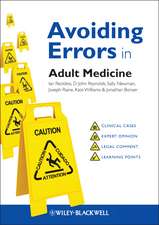Communicating to Manage Health and Illness
Editat de Dale E. Brashers, Daena Goldsmithen Limba Engleză Paperback – 24 iun 2009
| Toate formatele și edițiile | Preț | Express |
|---|---|---|
| Paperback (1) | 450.40 lei 6-8 săpt. | |
| Taylor & Francis – 24 iun 2009 | 450.40 lei 6-8 săpt. | |
| Hardback (1) | 1114.70 lei 6-8 săpt. | |
| Taylor & Francis – 24 iun 2009 | 1114.70 lei 6-8 săpt. |
Preț: 450.40 lei
Nou
Puncte Express: 676
Preț estimativ în valută:
86.21€ • 89.66$ • 72.24£
86.21€ • 89.66$ • 72.24£
Carte tipărită la comandă
Livrare economică 13-27 martie
Preluare comenzi: 021 569.72.76
Specificații
ISBN-13: 9780805844290
ISBN-10: 0805844295
Pagini: 360
Ilustrații: 3 tables
Dimensiuni: 152 x 229 x 30 mm
Greutate: 0.48 kg
Ediția:New.
Editura: Taylor & Francis
Colecția Routledge
Locul publicării:Oxford, United Kingdom
ISBN-10: 0805844295
Pagini: 360
Ilustrații: 3 tables
Dimensiuni: 152 x 229 x 30 mm
Greutate: 0.48 kg
Ediția:New.
Editura: Taylor & Francis
Colecția Routledge
Locul publicării:Oxford, United Kingdom
Cuprins
Introduction: Communicating to Manage Health and Illness
Daena J. Goldsmith, Ph.D., Lewis and Clark College
Dale E. Brashers, Ph.D., University of Illinois at Urbana- Champaign
Chapter 1: Physician-Patient Communication: Psychosocial Care, Emotional Well-Being, And Health Outcomes
Kelly B. Haskard, Ph.D., Texas State University
Summer L. Williams, M.A., University of California at Riverside
M. Robin DiMatteo, Ph.D., University of California at Riverside
Chapter 2: Unexamined Discourse: The Outcomes Movement as a Shift from Internal Medical Assessment to Health Communication
Bernice A. Pescosolido, Ph.D., Indiana University
Thomas W. Croghan, M.D., The Rand Corporation
Joel D. Howell, M.D., University of Michigan
Chapter 3: The Influence of Managed Care on Provider-Patient Interaction
Kevin Real, Ph.D., University of Kentucky
Richard L. Street, Jr., Ph.D., Texas A&M University
Chapter 4: Exploring the Institutional Context of Physicians’ Work: Professional and Organizational Differences in Physician Satisfaction
John C. Lammers, Ph.D. University of IL at Urbana-Champaign
Joshua B. Barbour, Ph.D., Texas A&M University
Chapter 5: Culture, Communication, and Somatization in Health Care
Howard Waitzkin, M.D., University of New Mexico
Chapter 6: The Theory of Bilingual Health Communication
Elaine Hsieh, Ph.D., University of Oklahoma
Chapter 7: Establishing and Defending Doctorability across the Consultation:
Contexts and Practices
John Heritage, Ph.D., University of California, Los Angeles
Chapter 8: Keeping the Balance and Monitoring the Self-System: Towards a More Comprehensive Model of Medication Management in Psychiatry.
Bruce Lambert, Ph.D., University of Illinois at Chicago
Naomi Levy, M. D., N. A. Levy & Associates, Ltd.
Jerome Winer, M.D., University of Illinois at Chicago
Chapter 9: The HIV Social Identity Model
Lance Rintamaki, Ph.D., SUNY Buffalo
Chapter 10: Stories and Silences: Disclosures and Self in Chronic Illness
Kathy Charmaz, Ph.D., Sonoma State University
Chapter 11: Understanding the Helper: The Role of Codependency in Health Care and Health Care Outcomes
Ashley Duggan, Ph.D., Boston College
Beth A. Le Poire, Ph.D., California Lutheran University
Margaret E. Prescott, Ph.D.
Carolyn Shepard Baham, Ph.D.
Chapter 12: Spirituality Provides Meaning and Social Support for Women Living with HIV
Jennifer Peterson, Ph.D., University of Wisconsin at Milwaukee
Chapter 13: Multiple Discourses in the Management of Health and Illness: Why Does it Matter?
Roxanne Parrot, Ph.D., The Pennsylvania State University
Daena J. Goldsmith, Ph.D., Lewis and Clark College
Dale E. Brashers, Ph.D., University of Illinois at Urbana- Champaign
Chapter 1: Physician-Patient Communication: Psychosocial Care, Emotional Well-Being, And Health Outcomes
Kelly B. Haskard, Ph.D., Texas State University
Summer L. Williams, M.A., University of California at Riverside
M. Robin DiMatteo, Ph.D., University of California at Riverside
Chapter 2: Unexamined Discourse: The Outcomes Movement as a Shift from Internal Medical Assessment to Health Communication
Bernice A. Pescosolido, Ph.D., Indiana University
Thomas W. Croghan, M.D., The Rand Corporation
Joel D. Howell, M.D., University of Michigan
Chapter 3: The Influence of Managed Care on Provider-Patient Interaction
Kevin Real, Ph.D., University of Kentucky
Richard L. Street, Jr., Ph.D., Texas A&M University
Chapter 4: Exploring the Institutional Context of Physicians’ Work: Professional and Organizational Differences in Physician Satisfaction
John C. Lammers, Ph.D. University of IL at Urbana-Champaign
Joshua B. Barbour, Ph.D., Texas A&M University
Chapter 5: Culture, Communication, and Somatization in Health Care
Howard Waitzkin, M.D., University of New Mexico
Chapter 6: The Theory of Bilingual Health Communication
Elaine Hsieh, Ph.D., University of Oklahoma
Chapter 7: Establishing and Defending Doctorability across the Consultation:
Contexts and Practices
John Heritage, Ph.D., University of California, Los Angeles
Chapter 8: Keeping the Balance and Monitoring the Self-System: Towards a More Comprehensive Model of Medication Management in Psychiatry.
Bruce Lambert, Ph.D., University of Illinois at Chicago
Naomi Levy, M. D., N. A. Levy & Associates, Ltd.
Jerome Winer, M.D., University of Illinois at Chicago
Chapter 9: The HIV Social Identity Model
Lance Rintamaki, Ph.D., SUNY Buffalo
Chapter 10: Stories and Silences: Disclosures and Self in Chronic Illness
Kathy Charmaz, Ph.D., Sonoma State University
Chapter 11: Understanding the Helper: The Role of Codependency in Health Care and Health Care Outcomes
Ashley Duggan, Ph.D., Boston College
Beth A. Le Poire, Ph.D., California Lutheran University
Margaret E. Prescott, Ph.D.
Carolyn Shepard Baham, Ph.D.
Chapter 12: Spirituality Provides Meaning and Social Support for Women Living with HIV
Jennifer Peterson, Ph.D., University of Wisconsin at Milwaukee
Chapter 13: Multiple Discourses in the Management of Health and Illness: Why Does it Matter?
Roxanne Parrot, Ph.D., The Pennsylvania State University
Descriere
This edited volume advances the theoretical bases of health communication in two key areas: communication, identity, and relationships; and health care provider patient interaction. Chapters aim to underscore the theory that communication processes are a link between personal, social, cultural, and institutional factors and various facets of health and illness.











